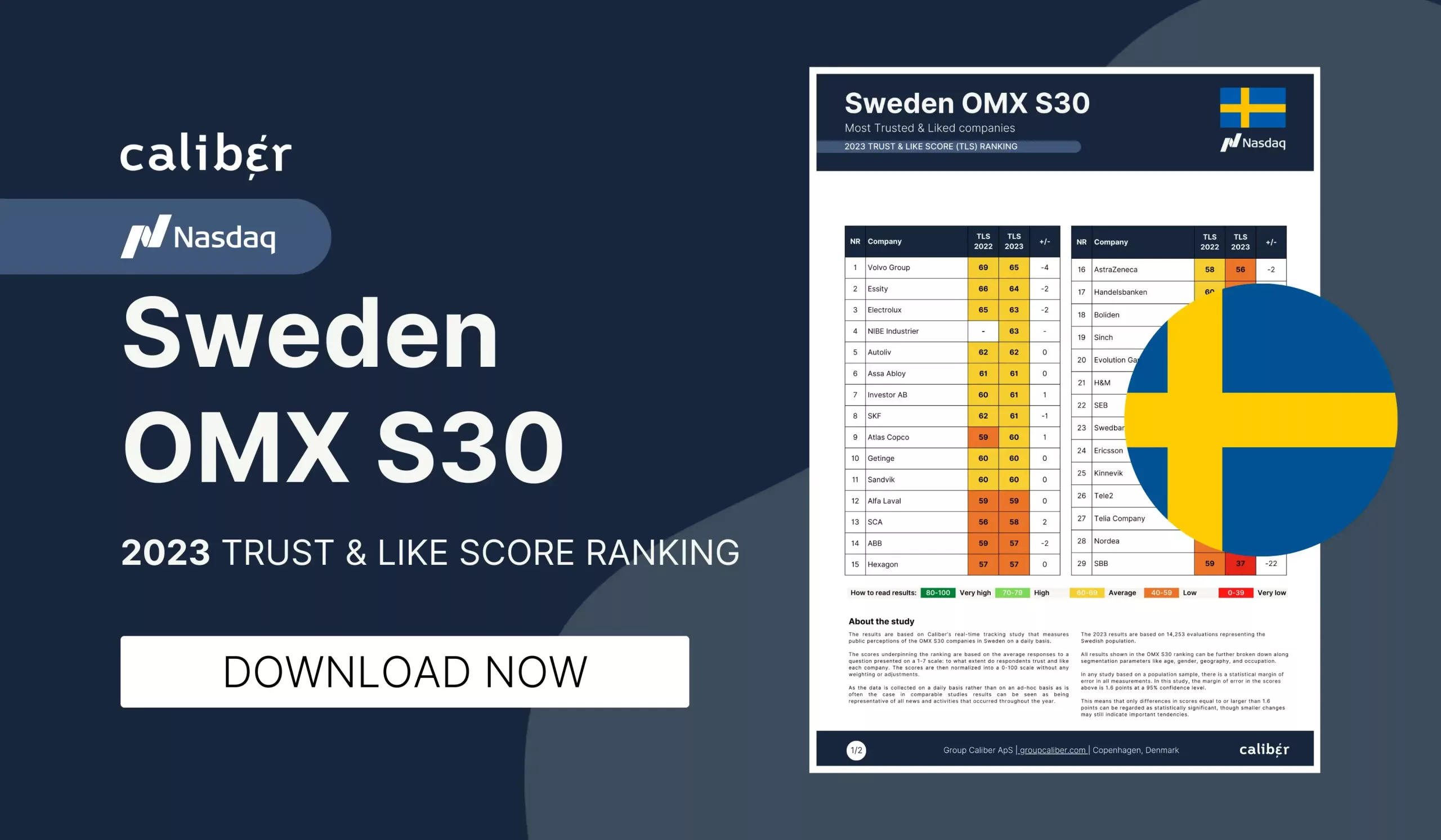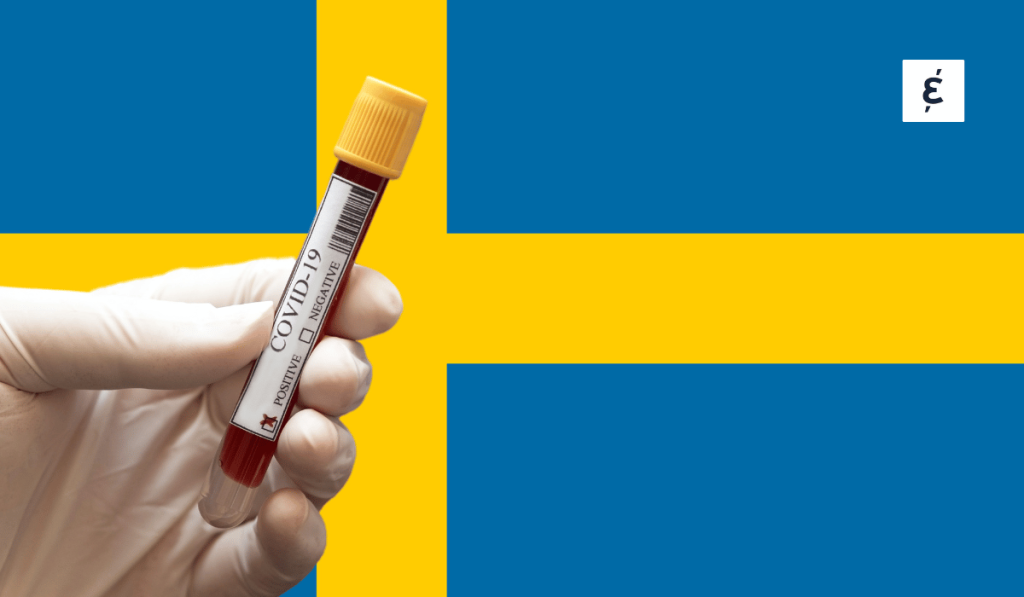

Most Swedish companies maintained their reputation throughout the crisis – with a few notable exceptions and an unexpected polarization of opinion in society.
It would come as no surprise that as a company that preaches the importance of real-time tracking of corporate reputation – we’ve been closely following global developments in recent weeks. We were, and still are, curious to see how public perceptions of companies and sectors change from week to week as the crisis unfolds and corporate reactions are scrutinized.
Who are the reputational winners and losers these days? Are there patterns across countries? Are they more influenced by the general public mood than by what companies actually do and say?
In Sweden, however, we saw a different trend and therefore wanted to investigate it more closely.
We have in previous publications looked at our reputation data from different countries around the world, and we could see that the COVID crisis has generally resulted in a negative impact on perceptions after a short period of positivity.
We postulated that the reason for that could have been an initial spirit of solidarity and sympathy with businesses that were negatively affected, followed by disillusionment when the depth of the crisis became clear and companies’ reactions fell short in people’s minds. But in Sweden, we saw a different pattern and decided to investigate it further.
Even during normal times, the average level of trust and affection that the public in Sweden holds towards the country’s largest companies is lower than in most other European countries – with the exception of Finland.
While the average Trust & Like Score (our measurement of reputation) of most of the company indices we follow in Europe tends to hover around 60-70 points on a 0-100 scale, in Sweden, it generally hovers around 55.
This could be a cultural phenomenon – higher skepticism towards large businesses in the national psyche or a tendency to be more conservative when rating performance in surveys. Most interestingly though, that level has decreased even further during the coronavirus crisis.
“…they are experiencing the economic devastation first hand and know there’s more to come”
The first thing we can see is that Sweden did not follow the pattern we’ve seen elsewhere, where general perceptions improved in the first few weeks of the crisis mid-March, only to drop later in April when reality set in.
In fact, in Sweden perceptions have kept bouncing up and down with no clear pattern that correlates to the gradual development of the crisis. Is that connected to the different ways in which the country reacted to the virus?
It may very well be – while most countries declared lockdowns that affected public mood in a distinct way, the hands-off approach of the Swedish government may have prevented a similar impact on the public mood there, which is reflected in the continuing normal volatility of reputation scores for Swedish companies.
Still, a clear negative trend has emerged in average reputation levels in Sweden as weeks went by. Does that suggest people’s views of most companies started deteriorating? Not necessarily.
We compared the reputation scores given by the Swedish public to each of the companies included in the OMX Stockholm 30 index before and after the crisis “hit”. To our surprise, more companies seem to have gone up in score than down.
One reason behind the average negative trend overall may be the fact that those companies whose reputations deteriorated had their scores decrease to a greater extent than the increase experienced by the others.
The reputations of companies like Volvo and H&M may have suffered due to their widely debated layoffs, while Nordea’s reputation has likely benefited from its Covid-related activities like offering mortgage and loan reliefs to its personal and business customers.
Furthermore, it is unsurprising that one can see positive trends for companies dealing in the healthcare sector and security such as Getinge and Securitas. Meanwhile, larger industries like Sandvik, Atlas Copco, Alfa Laval, and SCA show a significant common negative trend, which could be explained by lower-than-expected financial results presented early this year linked to the uncertainty of how COVID-19 will impact the possibility of improving these results.
Another interesting finding is the polarization of scores in Swedish society throughout the crisis: a breakdown of pre- and post-crisis score differences into demographics revealed that young people’s opinions of the OMX 30 companies have improved following the crisis, while the opposite happened among all other age groups – especially Millennials and Baby Boomers whose perceptions soured greatly in the course of the last few weeks.
This phenomenon is harder to explain but may reflect the different focus areas across these age groups: while Gen Z’ers are perhaps less concerned about the economic impact of the crisis and may not be too bothered about missing a few months of schoolwork, Millennials are very focused on jobs and career prospects, and may therefore experience a stronger negative impact on their general mood.
Baby Boomers, on the other hand, are probably most focused on their health, which may explain the decline in their overall perceptions.
When it comes to a geographic breakdown of scores, the polarization is even wider – with the sharpest decline seen among people in southern Sweden, a region that many claim has suffered from a lack of attention from the central government when it comes to healthcare and business support.
It is also a region that has seen its very important social and economic ties to Denmark with over 18.000 commuters every day completely cut off due to travel and work restrictions.
On the flip side, the scores in North-Middle Sweden have improved significantly. One reason could be the limited impact of Corona on general life in the more sparsely populated areas and thus people feeling safer.
When we look at average reputation scores split by people’s professions, we also witness contradicting trends – in some cases surprising. People working in the medical field are actually more positive in their opinions in recent weeks compared to before the crisis, despite having been at the forefront of the battle – which in other countries has led to a drop in their overall perceptions.
This may suggest that people working in the medical field in Sweden are keeping a sense of optimism despite the current difficulties. On the other hand, perceptions among business executives and owners have deteriorated sharply – they are experiencing the economic devastation firsthand and know there’s more to come.
What can we conclude from all these data about the reputational impact of Covid-19 in Sweden? First and foremost, we can certainly see that the picture in Sweden is different from elsewhere in Europe, just as much as – and perhaps because – the crisis is being handled so differently there: there is less of a “uniform” response to the crisis, neither in behavior nor in public perceptions of business.
But more importantly, segments of the population experience the crisis differently and therefore react differently – also when it comes to their trust in business: while young people, those living in North-Middle Sweden, and medical professionals express greater trust in business than they did before the crisis, the rest show the opposite, hence forming an overall negative reputational trend for the country’s companies throughout these corona days.
This polarization may also reflect the public debate raging in Sweden these days about how the country has handled the crisis so far and disagreements about the varying levels of impact on different segments of society
“Crises only reinforce what is true in normal times”
Most importantly, there is one truth we found in Sweden that is similar to what we found elsewhere: while some opinions are affected by a general mood or a collective mindset, people’s perceptions of companies still mostly depend on what each company does and how it behaves: those companies who were seen to be doing the right thing have also gotten the public vote, and vice versa.
Crises only amplify what’s true in normal times: how you behave as a company matters, and your resulting reputation will impact your commercial success. This is true in Sweden as it is true elsewhere, and the Coronavirus crisis has not changed that. If anything, it has made it all the more true.
© 2024 Group Caliber | All Rights Reserved | VAT: DK39314320